Lupine Lane strives to instill worldly knowledge, practical skills, respect of self and others, self-confidence and a love for creativity in every child. Our prime intention is to guide the whole child using integrated, play-based, experiential education.
Foundation
Whole Child Scope
The foundation considers the whole child, according to their unique developmental level. Our Whole Child Scope is implemented school-wide. The Whole Child Scope encompasses four key areas of development: cognitive, social-emotional, creative and physical. Each of the four categories is then expanded upon further into subcategories with specific objectives relevant to each age.
Cognitive
– Literacy
– Mathematics
– Culture/Language Studies
– Science
– Technology
Social/Emotional
– Interpersonal Skills
– Intrapersonal Skills
– Sense of Community
Creative
– Visual Arts
– Music
– Performance
Physical
– Sensory/Body Awareness
– Gross Motor Skills
– Fine Motor Skills
Key Developmental Goals
The Whole Child Scope is a framework for our Key Developmental Goals. The Key Developmental Goals are based on Key Child Development Theories and current research. These goals are specific to each age range and outline the developmental objectives that teachers will use to guide children toward through topic study. These goals will be outlined each week in the Weekly Intentions, or weekly lesson plans.
- – 2 to 3 Years Key Developmental Goals
- – 3 to 4 Years Key Developmental Goals
- – 4 to 5 Years Key Developmental Goals
- – 5 to 6 Years Key Developmental Goals
Key Child Development Theories and Current Research
Key Child Development Theories ensure that teachers guide each child in a developmentally appropriate and intentional manner. We utilize theory from: Jean Piaget, Erik Erikson, Abraham Maslow, Lev Vygotsky, John Dewey, Louise Derman-Sparks and Howard Gardner in addition to current research. This additional level of justification ensures that short and long-term goals have specific intention and rationale in early childhood development.
In the Classroom
Topic Study
Our curriculum is child-driven. This means individual classes utilize an interest-based exploration to ignite each child’s focus on a particular topic. When a topic of interest is discovered through exploration, discussion, observation and reflection, the class begins an in depth, multidimensional, interdisciplinary focus that lasts a couple of weeks to several months per topic. This approach includes progressive projects, which are supported with relevant and developmentally appropriate daily activities, materials and supplies. These practical, real-world experiences are provided within a caring, supportive environment and balanced with autonomous play experiences that support the topic study. This approach provides children with a balance of structure and freedom so they can fully benefit from their time during their early childhood years at school.
Below are links to blog posts on Topic Studies from each age group we serve. Find out more about how this child-driven, experiential, multi-dimensional method of teaching and learning provide children with endless opportunities to develop knowledge and skills, and, perhaps most importantly, instill a love for learning and creating.
Ducklings’ Derby Day Topic Study
18 Months to 2.5 Years
Hummingbirds’ Ocean Exploration Topic Study
2 to 3 Years
Penguins’ Animals and Their Habitats Topic Study
3 to 4 Years
Parrots’ Fun with Theatre Topic Study
3 to 4 Years
Peacocks’ Dinosaur Topic Study Topic Study
4 to 5 Years
Owls’ Friends and Family Topic Study
4 to 5 Years
Flamingos’ Invention Topic Study
5 to 6 Years
Weekly Intentions
The Weekly Intentions are the intended directions for the class each week. Our teachers develop their class Weekly Intentions using the framework of our Whole Child Scope and The Key Developmental Goals for the age range of their class. This ensures that the four key areas of development (cognitive, social-emotional, creative and physical) as well as the objectives are constantly considered as topic studies unfold in each class. The Weekly Intentions are emailed to families each week as well as posted outside of each classroom.
Topic Study Reflections
At the culmination of a topic study, teachers provide a Topic Study Reflection. This documentation provides an explanation of the breadth and depth of the focus. It illustrates how the Weekly Intentions were manifested, detailing the Key Developmental Goals that were addressed through the progressive project and supporting activities of the topic study.
Assessment
Weekly Reflections and Photos
Once a week, teachers document the children’s classroom experience with through a weekly reflection sent via email and post photos to the classroom’s Shutterfly Share Site. Teachers provide their account of how the children interpreted the Weekly Intentions and are working toward the Key Developmental Goals for their age range. This consistent, on-going, subjective assessment provides an overview of the children’s experiences at school through both written and photo documentation.
Key Developmental Goals Assessment
Key Developmental Goals are converted into objective assessment tools, with a subjective component since we value both equally. Key Developmental Goal Assessments are completed each semester and presented to the child’s family during fall and spring family/teacher conferences. A digital copy is then sent to the family and retained in the child’s file at school to inform the child’s teacher the following year.
- – 2 to 3 Years Key Developmental Goals Assessment
- – 3 to 4 Years Key Developmental Goals Assessment
- – 4 to 5 Years Key Developmental Goals Assessment
- – 5 to 6 Years Key Developmental Goals Assessment
Family/Teacher Conferences
Family/Teacher Conferences are provided once during the middle of the fall semester and once at the end of the spring semester. At each conference, teachers present the Key Developmental Goals Assessment to the child’s family and discuss the child’s progress overall.


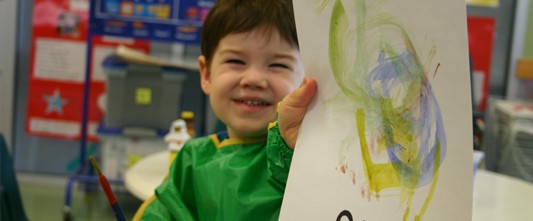
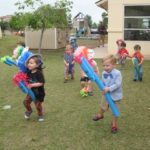
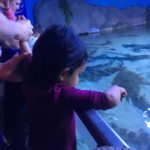
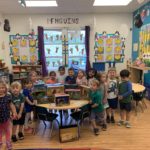
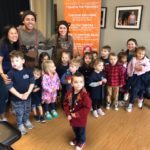
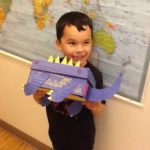
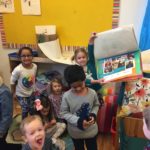
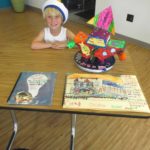
Pingback: Child Care in Lake Travis: Day Cares and Preschools for Your Future Cavs